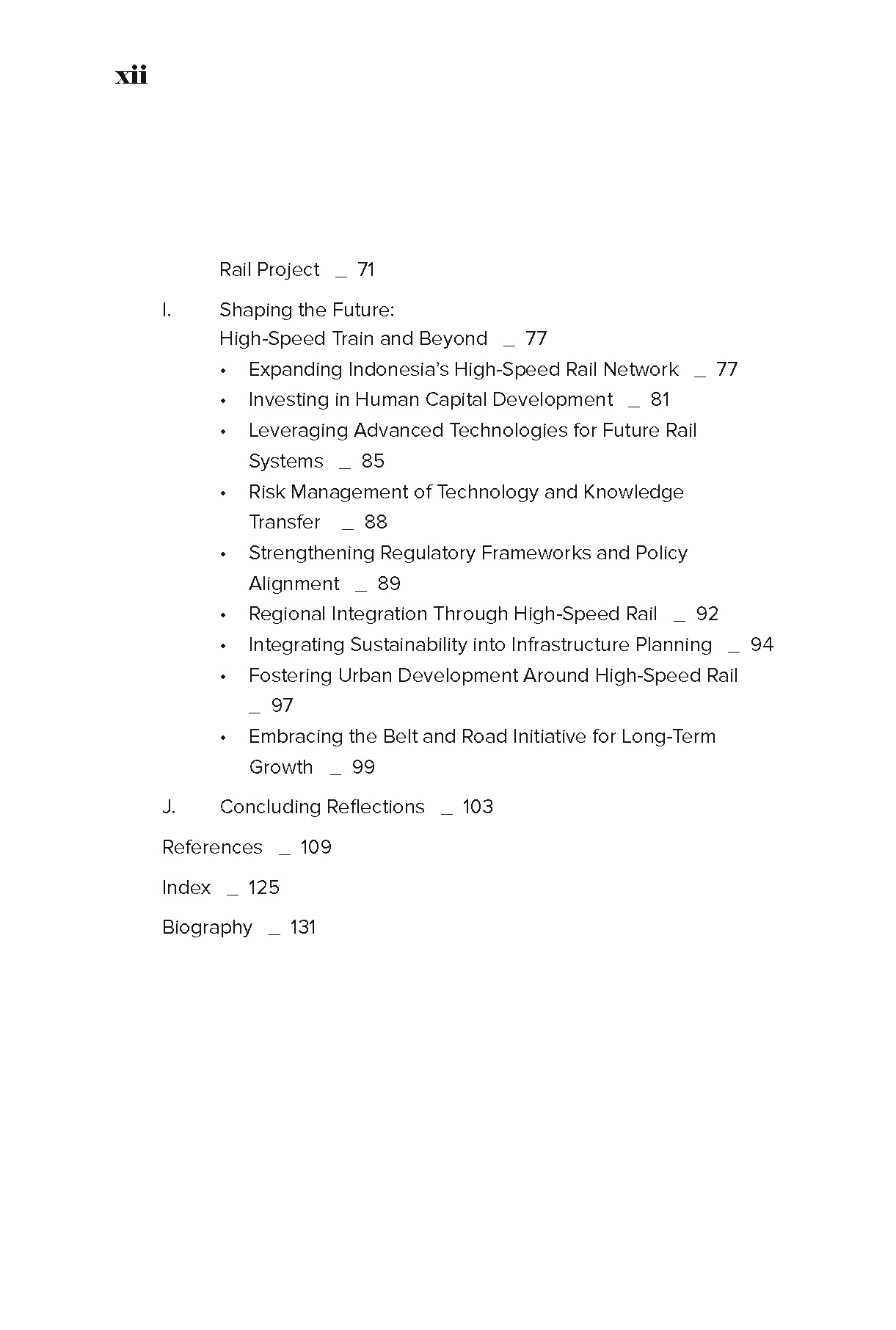TECHNOLOGY TRANSFER AND KNOWLEDGE EXCHANGE UNDER BELT AND ROAD INITIATIVE: THE CASE JAKARTA-BANDUNG HIGH-SPEED RAIL PROJECT
this book reflecting on the lessons learned from the Jakarta-Bandung High-
Speed Rail project and their implications for Indonesia’s future
infrastructure development. By synthesizing these insights, the book
seeks to contribute to the broader discourse on how technology
transfer and international cooperation can serve as tools for
sustainable development.

Human Resource Development and Capacity Building
The Jakarta-Bandung High-Speed Rail project represents a pivotal moment in the history of Indonesia’s infrastructure development and its broader relationship with China under the BRI. This book delves into one of the most significant aspects of this cooperation: technology transfer. Technology transfer, a central element of this project, refers to the process by which China, as a more technologically advanced nation in the realm of high-speed rail, shares its knowledge, expertise, and innovations with Indonesia (China Daily, 2024). The successful implementation of this transfer has the potential to not only modernize Indonesia’s transportation infrastructure but also elevate its technological capabilities and set a foundation for future self-reliance in large-scale infrastructure projects.
This book was developed with the purpose of examining how technology transfer is being executed within the framework of the Jakarta-Bandung High-Speed Rail project. The primary objective is to explore the methods, successes, and challenges associated with the transfer of knowledge and technology from China to Indonesia. In doing so, it offers a comprehensive analysis of how this project may influence Indonesia’s future in both infrastructure development and broader technological advancement. Indonesia has long faced challenges in modernizing its infrastructure (Wijaya & Nursamsu, 2020). With a rapidly growing population and an expanding economy, the need for efficient transportation systems has become increasingly urgent. The Jakarta- Bandung High-Speed Rail project is viewed as a major solution to some of these challenges, aiming to reduce travel time, improve connectivity between two major economic hubs, and alleviate traffic congestion (Wijaya, 2024). However, the importance of the project extends far beyond the immediate transportation benefits it provides. It serves as a case study in international cooperation and the potential for technology transfer to empower developing countries to become more self-sufficient in their technological and infrastructural advancements.
One of the key drivers behind this project is the Belt and Road Initiative, a Chinese-led global development strategy aimed at enhancing connectivity and fostering economic growth through infrastructure projects across Asia, Europe, and Africa (Johnston, 2019). For Indonesia, the BRI has provided access to funding, technology, and expertise that would have been difficult to secure domestically (Lumban Toruan, 2021). The Jakarta-Bandung High-Speed Rail project, as one of the flagship BRI projects in Southeast Asia, is emblematic of the broader goals of the initiative.
As such, it offers valuable insights into how developing countries like Indonesia can leverage international partnerships to accelerate their development.
This book is structured to provide a detailed exploration of the key components of the Jakarta-Bandung High-Speed Rail project, with a particular focus on the transfer of technology. It begins with an overview of the historical context of Indonesia-China relations, highlighting how these two nations have navigated a complex diplomatic landscape to forge a partnership based on mutual economic interests. Understanding this background is essential to appreciating the broader implications of their collaboration on the high-speed rail project and the role of the BRI in shaping Indonesia’s infrastructure development.
Following this, the book examines the technical aspects of the Jakarta-Bandung High-Speed Rail project itself, outlining the specific technologies being transferred from China to Indonesia. High-speed rail technology is sophisticated and encompasses a wide array of systems, from rolling stock to signaling systems and tracklaying
techniques. This section of the book seeks to break down these technologies and explore how they are being localized for use in Indonesia. It also investigates how Indonesian engineers and technicians are being trained to operate and maintain these systems, ensuring that the knowledge transfer is not merely superficial but
results in genuine capacity building.
Dapatkan Bukunya Sekarang Juga!
DAFTAR ISI
 Daftar Isi 1
Daftar Isi 1 Dafatar Isi 2
Dafatar Isi 2Spesifikasi Buku

Cetakan I, Januari 2025; 152 hlm, ukuran 15,5 x 23 cm, kertas isi Bookpaper hitam putih, kertas cover ivory 230 gram full colour, jilid lem panas (soft cover) dan shrink bungkus plastik.
Harga Buku
Sebelum melakukan pembayaran, cek ketersediaan stock kepada admin. Jika buku out of stock pengiriman membutuhkan waktu – 3 hari setelah pembayaran.
Rp 170.000
Rp 103,100
Tentang Penulis

Arie Kusuma Paksi, S.IP, M.A., Ph.D.
Dr. Arie Kusuma Paksi is a distinguished academic and expert in international relations with a specialized focus on the intersections of international development and technology transfer within the framework of China’s Belt and Road Initiative (BRI). As a lecturer and researcher at the International Relations Department of
Universitas Muhammadiyah Yogyakarta (UMY), Dr. Paksi engages deeply with the dynamics of geopolitical and economic changes in Southeast Asia induced by global development strategies. Dr. Paksi earned his Bachelor’s degree from UMY in 2006, his Master’s degree from Universitat Jaume-1, Spain in 2013, and his
Ph.D. from the University of Bradford, UK in 2018. His doctoral research provided a critical analysis of healthcare policy-making in post-conflict settings, offering a unique perspective on how such environments can leverage international aid and technological innovation for sustainable development.
A pivotal area of Dr. Paksi’s research involves examining the effects of the BRI on Indonesia, particularly focusing on how this colossal project facilitates technology transfer between China and Indonesia and its implications for local industries and infrastructure projects His work critically assesses how technology-driven investments under
the BRI can lead to sustainable economic growth and development, while also considering the challenges and opportunities that arise from such international collaborations. Dr. Paksi’s publications, which include detailed analyses of Indonesia’s strategic responses to global initiatives and the politics of development aid, have appeared in top-tier journals such as the Third World Quarterly and the Journal of Islamic World and Politics. These works underscore his expertise in navigating the complex layers of international policy, economic diplomacy, and development strategies.
Beyond his scholarly work, Dr. Paksi is actively involved in community development projects that incorporate technological solutions for economic development. His initiatives often focus on empowering local communities through the strategic application of digital marketing tools and sustainable business practices, reflecting
the core goals of the BRI in promoting economic interconnectivity and technological advancement. In forums both in Indonesia and internationally, Dr. Paksi
advocates for a balanced approach to understanding the socioeconomic impacts of the BRI. His presentations and workshops are critical resources for policymakers, industry leaders, and academic peers, driving forward discussions on how to maximize the benefits of international development projects like the BRI.